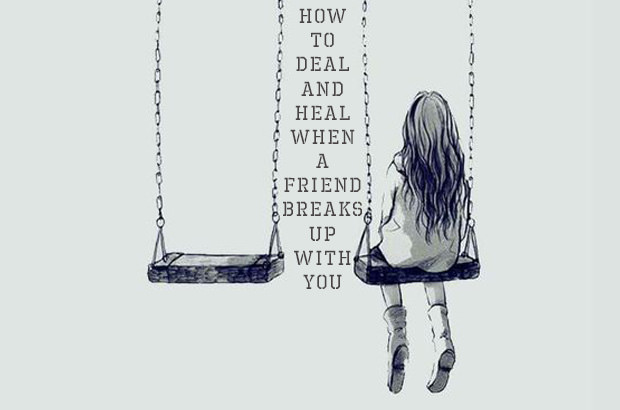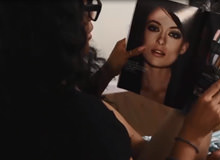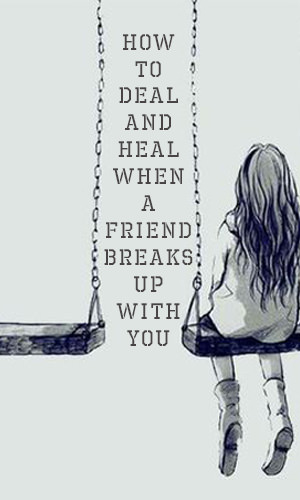
How to Deal—and Heal—When a Friend Breaks Up With You

Posted on 14 Mar, 2021

Maybe it starts with you seeing less of your friend. Then suddenly they aren’t calling you back as often, you’re always the one asking to hang out, and they don’t confide in you like they used to.
Or maybe you had a blowout fight and some harsh truths were spoken. You’ve always patched things up before, but this time you’re staring at your phone after sending an apology text and there’s nothing but silence.
Next thing you know, you haven’t heard from your friend in months. You’d like to confront them, but what would you say? It’s clear the friendship has expired and your former pal is not interested in reviving it.
Welcome to the brutal reality of friend breakups.
4 Common Causes of a Friend Breakup
 1. The Irreparable Wrong
1. The Irreparable Wrong
Epic arguments or disagreements can dissolve a friendship. Major or repeated breeches of trust—the most egregious: hooking up with a friend’s boyfriend/girlfriend—or huge disappointments, like bailing on a friend’s nuptials when you’re in the wedding party, can destroy what was once a close-knit bond. But it doesn't have to be something seemingly big; a friend might explode when she’s fed up with you cancelling plans time and again.
 2. The Slow Drift
2. The Slow Drift
According to experts, it’s not always the enormous wrongs that cause irreparable inter-pal ruptures. “The most common reason friends break up,” says psychologist Irene Levine, Ph.D., author of Best Friends Forever: Surviving a Breakup with Your Best Friend, “is that they simply drift apart, with one or both friends not having enough interest or energy to keep the friendship together. One of them may be more self-involved, have less of a need for companionship, or have less time for friends.”
 3. The Life Change
3. The Life Change
Shifting from one phase of life to another can impact a friendship. The transition from college to adulthood, for example, can slowly drive a wedge between undergrad buds—much like graduating from high school may have disconnected you from a homeroom BFF. One friend might move far away from a former confidant and lose touch. Or each pal may get absorbed by new careers or romantic relationships (often, both). Becoming a parent can further eat into the time each friend has to devote to one another.
 4. The Communication Gap
4. The Communication Gap
Differences in communication styles, which often become more apparent as each friend grows into adulthood, are another common cause for buddies breaking it off. Often one friend may be more of the smothering type, overwhelming the other with text messages, calls, or emails, explains Liz Pryor, author of What Did I Do Wrong? What to Do When You Don’t Know Why the Friendship Is Over. Few of us like to be suffocated, so if the smotherer doesn’t relent, the overwhelmed friend ends up pulling back or cuts off correspondence entirely just to get some breathing room.
“Friendships are voluntary relationships that have to be reciprocal,” Levine adds. “If one person wants more of a relationship than the other, it rarely works.”
Post-Breakup: Give Yourself Time
No matter how innocuous the reasons are for a former friend falling off the face of the earth, losing them is still incredibly painful—sometimes equally (if not more) painful than breaking up with a boyfriend or girlfriend.
 “We get flowers and sympathy when we breakup with a romantic partner, but not when we breakup with a friend,” Pyror says. “Friend breakups tend to go unacknowledged, which can contribute to why people suffer so much from them. When the public response is ‘Eh, it happens,’ you feel like you shouldn’t be mourning as much as you are.”
“We get flowers and sympathy when we breakup with a romantic partner, but not when we breakup with a friend,” Pyror says. “Friend breakups tend to go unacknowledged, which can contribute to why people suffer so much from them. When the public response is ‘Eh, it happens,’ you feel like you shouldn’t be mourning as much as you are.”
The closer you were to the friend you broke up with, the more you’re going to hurt. So give yourself adequate grieving time. Ramani Durvasula, Ph.D., Ph.D., a licensed clinical psychologist who’s helped many individuals mourn the loss of a BFF, recommends a minimum of six weeks. “Time can bring clarity,” Durvasula says.
In the interim, make yourself a priority, she adds. Get adequate sleep, stick to your usual routine, and, hard as it is, avoid social media. “It’s petty to launch diatribes in those public spaces, and it can be painful to be blocked or to see new things in your friend’s life that you aren’t a part of,” Durvasula explains. Instead, reap the benefits of unplugging and resetting.
Don’t get down on yourself if you find that you need more time. It’s not uncommon to ruminate over how unfair it is that your friend left your duo act. Nor is it weird to keep wondering what you did wrong and how you might have been able to change things. But if your bud really is done with the friendship (We know: harsh), then you need to find closure so you can move on.
Pryor suggests writing a letter to your former friend. (You don’t have to send it.) Avoid using it as an itemization of accusations. Rather, embrace it as an opportunity to confirm, once and for all, that things are over. If you really don’t know why you were broken up with, acknowledge that. For example: "I have no idea what's going on. My heart hurts. I thought I would reach out to you and make closure and admit we are no longer friends." But if you have a hunch you’ve done something wrong, acknowledge and own that: "I’m sorry about my part in our conflict, and I’ll miss you, but it’s clear it’s time for us to move on."
Try not to disavow all the good times you and your former friend had. “Just because a friendship ends doesn’t mean that negates what came before," Levine says.
And if things are really debilitating, talk with a mental health professional for more focused guidance and support, Durvasula recommends.
Become an Even More Awesome Friend
 The end of a relationship can be a call to examine what types of people you’re just not compatible with, what you may be doing that upsets others, or what kind of company you’re attracting—and whether you want things to remain that way.
The end of a relationship can be a call to examine what types of people you’re just not compatible with, what you may be doing that upsets others, or what kind of company you’re attracting—and whether you want things to remain that way.
“If similar problems recur across different relationships, you need to dig deeper to find out what role you’ve played in these breakups, Levine says.”
If you’ve noticed a troublesome pattern but you’re drawing a giant question mark on how to tweak it for the better, call in the professionals. A few sessions with a therapist can help you step outside the situation and assess how to protect yourself from future friendship drama.
That’s important because once you’ve come to terms with the loss of your former bud, you’ll realize that the fade out of one friend in your life leaves room for a new one to fade in. Take a look at your options. There’s likely an acquaintance in your midst whose friendship you can take to a deeper level now that you’ve got more time and energy to devote to others.
[Related: 7 Foolproof Ways To Win Friends And Influence People]
The Takeaway
You and your pal may have been BFFs, but in truth “most friendships change, and they rarely last forever,” Levine says. Consider if this was this the type of person you wanted to be friends with anyway. If so, what might you do differently in future relationships? Own whatever misdeeds you think you’ve done (without beating yourself up too much), and don’t lose sight of the good times you had. Take this as an opportunity to learn and use the insights that you gain in future friendships that await.
Great Books For Getting Your Life Back On Track

by Pema Chodron


by Yasmin Mogahed

by lyanla Vanzant
 Forget About Being That Girl. Just Be You!
Forget About Being That Girl. Just Be You! How I Stay Calm When I Feel Like I'm About to Lose It
How I Stay Calm When I Feel Like I'm About to Lose It How to Apply Success From One Area of Your Life to Another (That Needs It)
How to Apply Success From One Area of Your Life to Another (That Needs It) How To Come Up With A Kick-Ass Personal Mantra
How To Come Up With A Kick-Ass Personal Mantra










